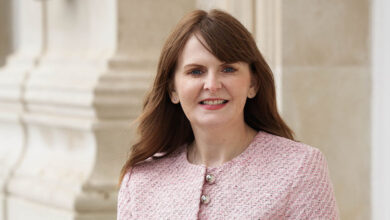Shaping the rural future
Michelle Gildernew updates Richard Halleron about the Rural Development Programme’s implementation and shares her hopes for how it will benefit people living in Northern Ireland’s countryside.
Farm Minister Michelle Gildernew makes no secret of the importance she places on the implementation of a rural development programme for Northern Ireland which will make a real and positive difference for farmers and everyone else living and working in the countryside.
“The Rural Development Programme is worth over £500 million and is the biggest ever investment in rural communities across the North,” she told agendaNi.
“I cannot overstate the importance of the Rural Development Programme to farmers, rural businesses, landowners and rural communities. Over recent years rural areas have undergone considerable demographic, social and economic change. These changes have presented challenges, but also provide opportunities to shape our future. Through the Rural Development Programme, working in partnership with local communities, we can make a difference in rural areas and to the lives of people living, working and visiting there.
“The Rural Development Programme has been specifically designed to provide hands-on support, advice and assistance, aimed at serving the needs of local communities and strengthening the local economy. It aims to make agriculture, horticulture and rural businesses more competitive. The programme also seeks to develop a more sustainable environment and to improve the quality of life for rural dwellers.”
The Minister added: “I have had the pleasure of visiting a wide variety of schemes and projects as well as meeting many dedicated people involved in rural development. There are many excellent initiatives throughout the North that demonstrate how the Rural Development Programme is making a real difference to rural communities.
“I am determined that support and funding will reach those rural communities and businesses that need it most. I am also committed to promoting equality of opportunity and encouraging uptake, particularly by rural women and young people.”
In her view, the programme builds on past strengths, working closely with stakeholders and in partnership with rural communities.
“I firmly believe that we can create prosperity for future generations and achieve our goal of confident, vibrant and sustainable rural communities across the North,” Gildernew states. “The Rural Development Programme is a crucial part of our work in supporting rural communities and it is part of a package of initiatives that I have brought forward to tackle rural issues. Others include leading the process in developing the North’s first rural white paper, our anti-poverty and social inclusion programmes and our rural champion work looking at how to enhance the rural proofing process.”
Themes
Funding and support under the Rural Development programme is organised into three themes, often referred to as ‘axes’. Axis 1 of the programme is specifically aimed at farmers and farm businesses. It will help to improve the performance of agricultural and forestry businesses by funding farm modernisation, helping businesses to improve their processing and marketing skills and supporting projects that will strengthen supply chain partnerships. Advice, mentoring and training will also be available for farmers and their families. Approximately £45 million is available under this axis.
Axis 2 deals with environmental stewardship. It will help to improve the environment and the countryside through schemes such as the Countryside Management Scheme and the Organic Farming Scheme. Support will also be available for those farming in less favoured areas and for land owners who wish to convert their land to forestry use, or who are maintaining existing afforested areas. Axis 2 is worth approximately £380 million.
Axis 3 of the Rural Development Programme will help to improve the quality of life in rural areas by supporting a wide range of activities. These include diversification into non-agricultural activities, support for business creation, encouragement of tourism activities, village renewal, basic services for rural communities and development and conservation and upgrading of the rural heritage. Approximately £100 million is available.
“All funding has been allocated for expenditure across the lifetime of the programme but there will be scope to realign funding within the programme, particularly following the mid-term evaluation in 2010,” Gildernew further explained.
“The mid-term evaluation will look at the programme’s effectiveness and efficiency, its socio-economic impact and its utilisation of resources.”
Benefits
The Rural Development Programme is made up of a wide range of measures, targeted at all aspects of rural life. As such, there are many different potential beneficiaries of Rural Development Programme funding.
“Farmers and farm families are one of the main beneficiaries of the programme,” the Minister stressed.
“There are funding measures specifically for farmers who wish to modernise, learn new skills and new ways of working, and who want to improve the competitiveness of their farm business generally. Farmers can also benefit by accessing funding to help them adopt farming practices that enhance our countryside, assist them to convert to organic farming, or grow willow as a renewable energy crop. The Rural Development Programme also provides funding to those farmers who farm in naturally less favoured areas of the North. Farmers and landowners can also access grants to create new woodland, or to maintain existing areas of woodland.
“There is also grant aid available for farm diversification, which aims to increase farm household income and create employment opportunities by providing assistance for farm households to diversify into non-agricultural activities on farm.”
In total, over 75 per cent of the total programme funding will go directly to support the farming sector. Agri-food and forestry businesses benefit from funding designed to help them improve the competiveness of agricultural, horticultural and forestry products in the marketplace. They can also access funding that helps them add value to their products through the application of appropriate technology together with sound manufacturing processes.
Anyone living or working in a rural community can access grants to help them start a new business, support existing rural tourism initiatives or develop new ones.
Michelle Gildernew also confirmed that rural communities, as a whole, will benefit from funding which supports basic services for the economy and rural population, support integrated village initiatives which promote community development and regeneration, and assisting rural communities to preserve and upgrade their rural heritage.
With regard to the implementation timetable, certain measures, such as support for those farming in less favoured areas and forestry, were in place from the start of the programme in January 2007. The Processing and Marketing Grant Scheme then opened in December 2007.
“Other measures have opened steadily since then, and at the end of March this year, over £100 million of Rural Development Programme funds had been paid out,” she added
Countryside Agri Rural Partnership Ltd has been appointed to deliver the Farm Modernisation Programme, focus farms, family farm options, benchmarking and supply chain development schemes.
The Farm Modernisation Programme opened earlier in the year and experienced high volumes of applications; 434 letters of offer have now issued and it is expected that all letters of offer will be issued by end of June. That programme’s second tranche will open next year, following a full review of its first phase.
“Agri-environment programmes are always popular with farmers and landowners and these opened for a twomonth window in 2008. I will announce my plans for tranche two of the Countryside Management Scheme and Organic Farming Scheme shortly,” she continued.
“The forestry measures under the Rural Development Programme, including the Short Rotation Coppice Scheme, have been open since 2007 and will remain open for the duration of the programme.
“Setting up the council committees and local action group delivery structures required for Axis 3 has taken time. I’m pleased to say however that all council committees and local action groups have now opened for expressions of interest, with over 1,000 received so far. I expect the first letters of offer for Axis 3 measures to issue this summer. My department will continue to make commitments under the current Rural Development Programme until 2013, with all payments made by 2015.”
Delivery
A range of groups and organisations will be involved in the delivery of the Rural Development Programme.
“My department, in addition to acting as the managing authority for the programme, delivers a number of measures directly,” the Minister commented.
“These are the Processing and Marketing Grant Scheme and Marketing and Development Grant Scheme under Axis 1. The Countryside Management Scheme, Organic Farming Scheme and Less Favoured Areas Compensatory Allowance measures under Axis 2 are also delivered by DARD.”
The Forest Service – an executive agency of DARD – delivers the forestry measures under Axis 2, and the Short Rotation Coppice Scheme. The Countryside Agri Rural Partnership, meanwhile, is a consortium led by Countryside Services Ltd, working together with the Rural Development Council and AI Services Ltd, and was appointed earlier this year. Axis 3 measures are delivered by seven groups of local councils, formed under joint committees and working with local action groups.
Gildernew highlighted the fact that these groups are representative of agricultural, rural, political, business and community interests in their specific catchment areas. They will play a key role in deciding how money is spent and to ensure that the needs of local communities are at the heart of the Rural Development Programme. While not delivering funding measures, the Rural Network has an important role to play in the implementation of the programme.
“The Rural Network for Northern Ireland is designed to help and support the implementation and delivery of the programme across all axes,” explained Gildernew.
“It does this by identifying and sharing good practice, working with local action groups to identify their learning and training needs, providing training and supporting local action groups to promote and assist the development of cooperation projects. A range of agricultural, environmental and rural stakeholders also assist in delivering the programme through their active participation in the programme’s monitoring committee.”
DARD is the managing authority for the Rural Development Programme and is, therefore, responsible for the efficient, effective and corporate management and implementation of the programme.
“My department will ensure that the programmes and funding measures are subject to economic assessment and are equality proofed and that projects are selected for funding in accordance with agreed criteria, that information is collected for monitoring and evaluation purposes,” the Minister said in conclusion.
“Staff will also act to make certain that beneficiaries and other bodies involved are aware of their obligations under the programme, that the various scheme evaluations are carried out within required time limits and to ensure compliance with the European Commission’s publicity requirements.
“DARD acts as the paying agency for the Rural Development Programme, and is responsible for making all payments of eligible expenditure under this programme.
“My department is also responsible for promoting the Rural Development Programme, and ran a major advertising campaign earlier in the year to raise the programme’s profile. Advertising and promotion is essential to help us bring the benefits of the programme to as many people as possible.
“The department is also responsible for chairing and providing secretariat functions for the programme monitoring committee. It draws up the annual progress reports and, after approval by the monitoring committee, submits them to the European Commission.
“I described earlier the funding measures which are delivered directly by DARD. My department also manages the contracts with its delivery bodies, and provides advice and guidance to these bodies, and to the general public, on a range of issues related to the Rural Development Programme.”





